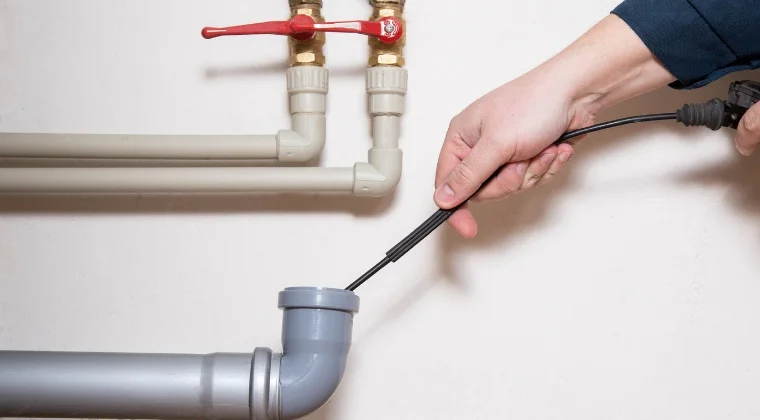
How to Unclog a Drain Pipe
Addressing a clogged drain pipe requires a methodical approach and a keen understanding of the factors contributing to the blockage.
From common causes like grease buildup to more complex issues such as tree root intrusion, the solutions vary based on the nature of the obstruction.
Stay tuned to uncover practical tips and expert insights on unclogging drain pipes to guarantee the uninterrupted flow of water in your home.
Key Takeaways
- Use tools like plumbing snakes and plungers for effective drain unclogging.
- Inspect and remove visible obstructions in drain pipes promptly.
- Consider professional assistance for stubborn clogs or complex issues.
- Prevent future clogs with regular maintenance and repair of drain pipes.
What Causes a Clogged Drain?
Clogged drains often result from the accumulation of grease, oil, food particles, hair, and soap scum in pipes, leading to blockages and slow drainage.
Understanding these common reasons for drain clogs helps identify specific causes and implement preventive measures to avoid future issues.
Common Reasons for Drain Clogs
Commonly found in household drain pipes, various substances such as fatty oils and greases, food particles, hair strands, and soap residue contribute to the obstruction and subsequent clogging of the pipes.
- Fatty substances like grease and oil solidify in kitchen drains, leading to clogs.
- Food particles that do not break down easily accumulate in piping, causing blockages.
- Hair from showering and shaving are common culprits for bathroom drain clogs.
- Soap scum coats pipes with residue, resulting in slow drainage issues.
How to Identify Early Signs of a Clog
Being vigilant for early indicators of clogs in drain pipes is essential for proactive maintenance and preventing potential plumbing issues.
- Keep an eye out for slow drainage in sinks, showers, or tubs, as well as water backup, which are early signs of potential clogs in the drainage system.
- Pay attention to gurgling noises emanating from drains, as they could signify air trapped in the pipes due to a blockage.
- Foul odors are another red flag, suggesting organic material buildup or stagnant water due to clogs.
- Water pooling around floor drains or in the basement is a clear indication of a possible blockage in the main drain pipe.
- Lastly, recurring clogs in multiple fixtures should not be ignored, as they signal a potential issue in the main drain line that requires immediate attention.
Effects of a Clogged Drain
The accumulation of various substances in household drain pipes, such as fatty oils, food particles, hair strands, and soap residue, can lead to detrimental effects on drainage systems.
- Clogged drains caused by grease buildup, hair clogs, or soap scum can result in slow drainage, foul odors, and potential plumbing issues.
- Grease buildup hardens over time, narrowing the pipe's diameter and obstructing the flow of water.
- Hair clogs can tangle and accumulate, forming a barrier that prevents proper water passage.
- Soap scum creates a sticky residue on pipe walls, attracting other debris and contributing to drain blockages.
Addressing these issues promptly is important to prevent further damage and costly repairs.
Preventive Measures to Avoid Clogs
To prevent drain clogs, implementing proactive measures in household maintenance is essential for ensuring peak plumbing functionality and reducing the risk of blockages.
Here are some preventive measures to avoid clogs:
- Avoid Clog-Causing Substances: Dispose of coffee grounds, grease, and clumping materials in sinks cautiously.
- Proper Disposal Techniques: Use plenty of cold water with a garbage disposal to flush food particles and prevent buildup.
- Regular Maintenance: Clean strainers and pop-up stoppers frequently to prevent debris accumulation in drains.
- Mindful Toilet Use: Limit toilet paper in toilets and dispose of other items in the trash to avoid blockages.
Methods to Unclog a Drain
When it comes to unclogging a drain, several effective methods can be used.
These methods include:
- Utilizing a combination of baking soda and vinegar
- Employing a drain snake or auger to physically remove blockages
- Using hot water in conjunction with a plunger to dislodge clogs
Each of these techniques offers a practical solution to address different types of drain obstructions efficiently.
Using Baking Soda and Vinegar
An effective method for unclogging drains involves utilizing the chemical reaction produced by combining baking soda and vinegar.
When baking soda and vinegar are poured down the drain, they create a fizzing action that helps dislodge debris and clear the pipe.
This non-toxic method can dissolve blockages in drain pipes effectively. To use this natural solution, pour baking soda down the drain followed by vinegar, allowing the mixture to sit for about 15 minutes.
Afterward, flush the drain with hot water to help wash away the dissolved clogs.
Using a Drain Snake or Auger
The utilization of a drain snake or auger presents an effective method for clearing deep-seated blockages within drain pipes.
These tools are specifically designed to tackle stubborn clogs caused by hair, soap scum, and food particles.
Drain snakes are available in various lengths to accommodate different pipe sizes and reach varying depths of obstructions.
On the other hand, augers feature a coiled end that rotates to grab and pull out blockages from the pipe effectively.
Using Hot Water and a Plunger
Using a combination of hot water and a plunger is a practical and effective method for unclogging drain pipes in both kitchen sinks and toilets.
- Start by boiling 8-12 cups of water and carefully pour it down the drain to soften and break down clogs.
- Next, use a sink plunger for sinks or a toilet plunger for toilets to plunge the drain and dislodge any obstructions. Make sure a tight seal while plunging to create the necessary pressure to force the clog to move.
- This method of combining hot water and plunging can often successfully clear minor clogs in drain pipes, providing a simple and efficient way to clear the obstruction and restore proper drainage.
Expert Advice for Unclogging Pipes
In maneuvering the process of unclogging pipes, it's essential to know when to seek professional assistance, understand effective DIY techniques for addressing drain blockages, and identify safe products for cleaning drains.
Knowing the appropriate time to call upon the expertise of a professional plumber can prevent further damage to the plumbing system.
Equipping oneself with knowledge of safe and efficient DIY methods, alongside using recommended drain-cleaning products, can help maintain the integrity of the pipes and prevent future clogs.
When to Call a Professional Plumber
Considering the complexity of persistent clogs and the potential risks of causing further damage to the pipes, seeking assistance from a professional plumber is highly recommended.
While expert tips for unclogging drains can be useful, certain situations may require the expertise of plumbing professionals.
If DIY methods fail to clear a clog or if there are signs of a more serious issue such as tree root-related blockages or broken pipes, it is advisable to call a professional plumber.
Licensed plumbers have the necessary tools and experience to handle complex clogs effectively, ensuring thorough drain cleaning and preventing potential damage to the pipes.
Berkeley Plumbing Pros offers reliable residential and commercial drain line repair services for such cases.
DIY Techniques for Unclogging Drains
When encountering persistent clogs that DIY methods struggle to resolve, seeking assistance from a professional plumber is often the prudent course of action.
However, for minor blockages, several DIY techniques can be effective.
Utilize a plumbing snake to pull out stubborn clogs, or try pouring a mixture of baking soda and salt followed by hot water down the drain to break down the obstruction.
Also, consider using a wet/dry vacuum on the wet setting to suck out clogs, ensuring to cover the vacuum vent with a plastic bag to catch any particles.
Safe Drain Cleaning Products to Use
Safe and environmentally friendly alternatives like baking soda and vinegar provide effective solutions for clearing clogs in household drain pipes.
These natural, non-toxic, and environmentally friendly options are safe alternatives to harsh chemical drain cleaners.
When combined, baking soda and vinegar create a foaming action that helps break down and dislodge blockages in pipes, allowing for smoother water flow.
Regular maintenance using these safe alternatives can prevent clogs and maintain the proper functioning of your plumbing system.
Preventative Maintenance for Drain Pipes
Regularly cleaning drains by clearing strainers and stoppers can prevent the accumulation of debris in drain pipes, reducing the risk of clogs.
Identifying early signs of a potential clog, such as slow drainage or gurgling sounds, allows for timely intervention to prevent more significant issues.
Proper drain maintenance, including avoiding disposing of harmful substances down drains and using cold water to flush food particles, is essential for ensuring smooth water flow and preventing blockages.
Tips for Regularly Cleaning Drains
Maintaining clean drains through regular upkeep is important for preventing clogs and ensuring the best water flow in your piping system.
Here are some tips for regularly cleaning drains:
- Flushing with Hot Water: Regularly flush drains with hot water to dissolve build-up and prevent blockages.
- Using Baking Soda and Vinegar: Monthly use a mixture of baking soda and vinegar to break down residue in drain pipes.
- Installing Drain Strainers: Place drain strainers in sinks and tubs to catch hair and debris, reducing the likelihood of clogs.
- Professional Drain Cleaning: Consider professional drain cleaning services for deep cleaning to prevent future clogs and maintain overall pipe health.
Importance of Proper Drain Maintenance
Vigilantly observing early indicators of potential clogs in drain pipes is important for proactive maintenance and averting plumbing complications, underscoring the importance of proper drain upkeep.
Regular drain maintenance is essential in preventing costly repairs and preserving the integrity of your plumbing system.
Implementing preventative measures such as using drain strainers and refraining from pouring grease down drains can greatly extend the lifespan of your pipes.
Clogged drain pipe? Our Professional Plumbers Can help
Experiencing a clogged drain pipe can disrupt your daily routine, but our team of professional plumbers in Berkeley is here to provide expert assistance and efficient solutions.
When facing a stubborn clog in your drain line, traditional methods like plungers and boiling water may not guarantee.
This is where the expertise of a professional plumber comes in.
Don't let a clog slow you down; contact our professional plumbers for prompt and reliable service.
Frequently Asked Questions
What can I pour down my main drain to unclog?
You can use a mixture of baking soda and vinegar or a commercial drain cleaner. Avoid harsh chemicals like bleach or drain cleaners containing lye.
Can a plunger unclog a main sewer line?
Plungers are more effective for smaller clogs in toilet bowls or sink drains. For main sewer line clogs, it's recommended to use a sewer auger or hydro jetting.
How do you unblock an underground drain pipe?
For underground drain pipes, you may need to use a sewer auger or a professional plumbing service with specialized equipment for locating and clearing the blockage.
How to unclog a drain pipe in the wall?
To unclog a drain pipe in the wall, you can use a plumber's snake or auger. If the blockage is severe or inaccessible, it's advisable to seek professional help to avoid causing damage to the pipe.

